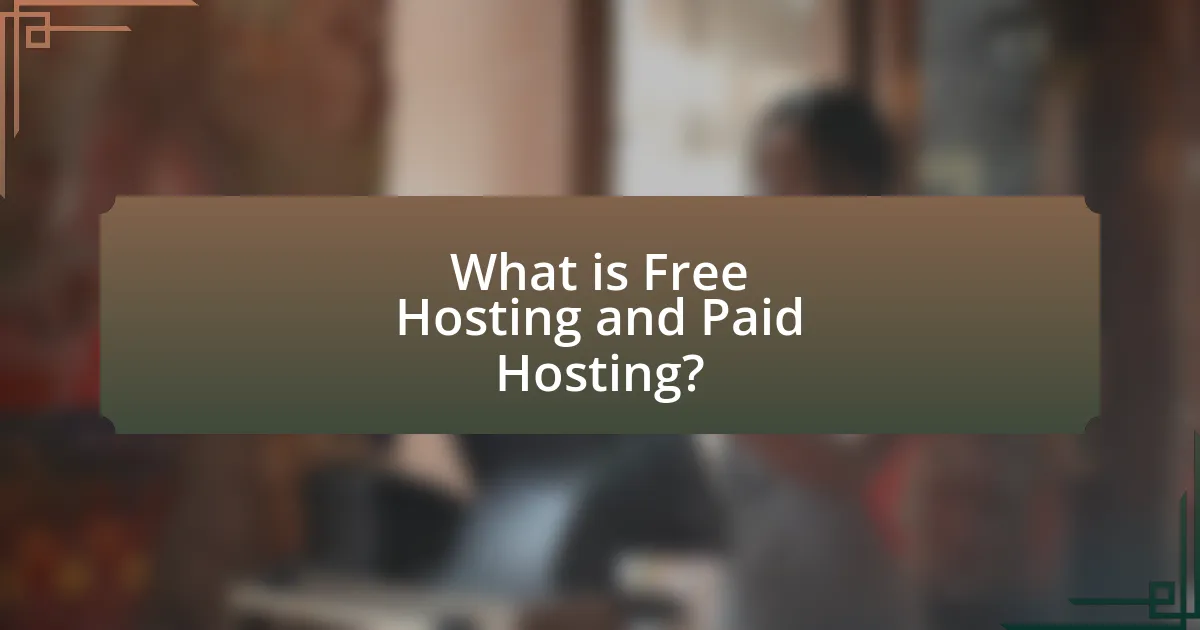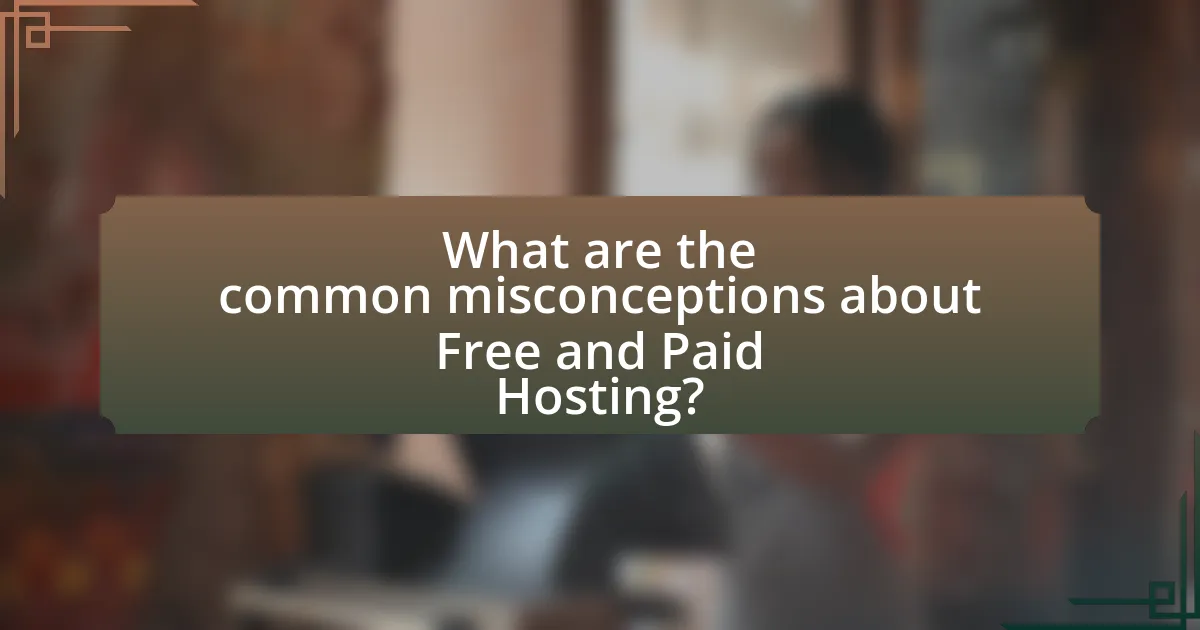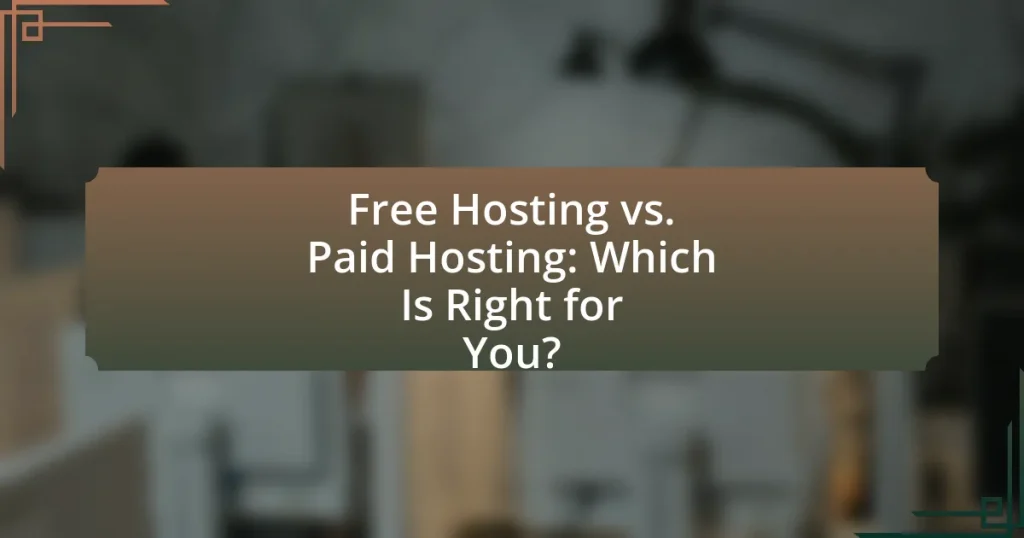The article examines the differences between free hosting and paid hosting, highlighting their respective features, advantages, and limitations. Free hosting offers cost-effective solutions with limited resources and support, making it suitable for personal projects or small websites. In contrast, paid hosting provides enhanced performance, security, and customer support, essential for businesses and high-traffic sites. Key considerations for choosing between the two options include reliability, scalability, and the specific needs of the website, with a focus on how these factors influence overall user experience and satisfaction.

What is Free Hosting and Paid Hosting?
Free hosting is a service that allows users to host their websites without any cost, typically supported by advertisements or limited features. In contrast, paid hosting requires users to pay a fee for enhanced services, including greater storage, bandwidth, and customer support. According to a 2021 survey by HostingAdvice, 70% of users prefer paid hosting due to its reliability and performance, highlighting the trade-off between cost and quality in web hosting options.
How do Free Hosting and Paid Hosting differ?
Free hosting and paid hosting differ primarily in terms of resources, features, and support. Free hosting typically offers limited storage, bandwidth, and lacks advanced features such as custom domain names, SSL certificates, and technical support, making it suitable for personal projects or small websites. In contrast, paid hosting provides greater resources, enhanced security, and customer support, which are essential for businesses and professional websites. For example, paid hosting plans often include dedicated server resources and 24/7 customer service, which are critical for maintaining website performance and reliability.
What are the key features of Free Hosting?
Free hosting typically offers features such as limited storage space, restricted bandwidth, and basic customer support. These services often include subdomain usage instead of a custom domain, and they may display advertisements on hosted sites. Additionally, free hosting providers usually lack advanced features like SSL certificates, email accounts, and technical support, which are common in paid hosting plans. The limitations in resources and support are designed to encourage users to upgrade to paid options for enhanced performance and reliability.
What are the key features of Paid Hosting?
Paid hosting offers several key features that distinguish it from free hosting. These features include enhanced performance, as paid hosting typically provides dedicated resources such as CPU and RAM, leading to faster load times and better reliability. Additionally, paid hosting includes custom domain names, allowing users to establish a professional online presence. Security is another critical feature, with paid hosting often providing SSL certificates, regular backups, and advanced security measures to protect against cyber threats. Furthermore, paid hosting usually offers customer support, including 24/7 assistance, which is often lacking in free hosting services. Lastly, scalability is a significant advantage, as paid hosting plans can be upgraded easily to accommodate growing website needs. These features collectively ensure a more robust and secure hosting environment for users.
Why do people choose Free Hosting?
People choose free hosting primarily due to its cost-effectiveness, allowing individuals and small businesses to establish an online presence without financial investment. This option is particularly appealing for those testing ideas, launching personal projects, or operating on limited budgets. According to a survey by HostingAdvice, 70% of users opt for free hosting to save money, highlighting its popularity among startups and hobbyists. Additionally, free hosting often provides essential features like website builders and basic storage, making it accessible for users with minimal technical skills.
What are the advantages of using Free Hosting?
Free hosting offers several advantages, primarily cost savings, as it allows users to create and maintain a website without any financial investment. This is particularly beneficial for individuals or small businesses with limited budgets who want to establish an online presence. Additionally, free hosting often includes user-friendly tools and templates, making it accessible for those with minimal technical skills. Many free hosting services also provide basic customer support, which can assist users in troubleshooting common issues. Furthermore, free hosting can serve as a testing ground for new ideas or projects, enabling users to experiment without the risk of financial loss.
What limitations come with Free Hosting?
Free hosting typically comes with several limitations, including restricted storage space, limited bandwidth, and lack of customer support. These constraints can hinder website performance and scalability, as many free hosting services impose caps on the amount of data that can be stored and transferred. Additionally, free hosting often includes mandatory advertisements, which can detract from the user experience and brand image. Security features are usually minimal or non-existent, increasing vulnerability to cyber threats. Furthermore, users may not have access to custom domain names, which can affect professionalism and credibility. These limitations make free hosting less suitable for businesses or serious projects that require reliability and growth potential.
What are the reasons to opt for Paid Hosting?
Paid hosting offers enhanced performance, reliability, and support compared to free hosting. Users benefit from faster loading times due to dedicated resources, which can improve user experience and SEO rankings. Paid hosting typically includes a higher level of security, protecting websites from threats and data breaches, which is crucial for businesses handling sensitive information. Additionally, paid hosting services provide customer support, ensuring that technical issues can be resolved promptly, which is often lacking in free hosting options. According to a study by HostingAdvice, 70% of users reported better uptime and support with paid hosting services, reinforcing the advantages of investing in a paid solution.
What benefits does Paid Hosting provide?
Paid hosting provides enhanced performance, reliability, and support compared to free hosting options. Users benefit from faster loading times due to dedicated resources, which can improve user experience and SEO rankings. Additionally, paid hosting typically includes better uptime guarantees, often exceeding 99.9%, ensuring that websites remain accessible to visitors. Furthermore, paid hosting services offer customer support, often available 24/7, which is crucial for resolving technical issues promptly. Security features, such as SSL certificates and regular backups, are also commonly included, protecting websites from data breaches and loss. These advantages make paid hosting a more robust choice for businesses and serious web projects.
How does Paid Hosting address the limitations of Free Hosting?
Paid hosting addresses the limitations of free hosting by offering enhanced resources, reliability, and support. Unlike free hosting, which often imposes bandwidth and storage limits, paid hosting provides scalable options that accommodate growing websites. Additionally, paid hosting typically includes a custom domain name, which enhances branding and professionalism, while free hosting often requires subdomains that can detract from credibility. Security features, such as SSL certificates and regular backups, are standard in paid hosting, mitigating risks associated with data loss and cyber threats that are common in free hosting environments. Furthermore, paid hosting services usually offer customer support, ensuring that users can resolve issues promptly, a feature often lacking in free hosting solutions.

What factors should you consider when choosing between Free and Paid Hosting?
When choosing between Free and Paid Hosting, consider factors such as reliability, support, features, and scalability. Free hosting often lacks reliability, with limited uptime and performance, while paid hosting typically offers guaranteed uptime and better server resources. Support is another critical factor; free hosting usually provides minimal or no customer support, whereas paid options often include 24/7 assistance. Features like storage space, bandwidth, and domain registration are generally more generous in paid hosting plans, which can enhance your website’s functionality. Lastly, scalability is essential; paid hosting allows for easier upgrades as your website grows, while free hosting may restrict your ability to expand.
How does your website’s purpose influence your hosting choice?
A website’s purpose significantly influences its hosting choice by determining the required resources, performance, and reliability. For instance, an e-commerce site necessitates robust security, high uptime, and fast loading speeds, which are typically offered by paid hosting services. In contrast, a personal blog may function adequately on free hosting, which often has limited resources and support. According to a study by HostingAdvice, 70% of businesses reported that their website performance directly impacted customer satisfaction, underscoring the importance of selecting a hosting option that aligns with the website’s objectives.
What type of website is best suited for Free Hosting?
Static websites are best suited for free hosting. These websites typically consist of simple HTML pages without complex server-side processing or databases. Free hosting services often impose limitations on bandwidth, storage, and features, making them ideal for personal blogs, portfolios, or small informational sites that do not require extensive resources. According to a survey by HostingAdvice, over 60% of users on free hosting platforms utilize them for basic projects, confirming that static content aligns well with the constraints of free hosting options.
What type of website requires Paid Hosting?
Websites that require paid hosting typically include e-commerce sites, business websites, and those with high traffic or specific technical needs. E-commerce sites need secure payment processing and reliable uptime, which paid hosting provides. Business websites often require custom domains, professional email addresses, and enhanced security features, all of which are standard in paid hosting plans. Additionally, websites expecting high traffic benefit from the scalability and performance optimization that paid hosting offers, ensuring a better user experience.
What budget considerations should you keep in mind?
When considering a budget for hosting, it is essential to evaluate the total cost of ownership, which includes initial setup fees, monthly or annual subscription costs, and potential upgrade expenses. Free hosting may seem cost-effective initially, but it often lacks essential features such as customer support, bandwidth limits, and security measures, which can lead to additional costs in the long run. In contrast, paid hosting typically offers better reliability, performance, and support, which can justify the higher upfront investment. According to a study by HostingAdvice, businesses that invest in paid hosting services experience 99.9% uptime compared to 90% for free hosting options, highlighting the importance of considering long-term value over initial savings.
How can you evaluate the cost-effectiveness of Paid Hosting?
To evaluate the cost-effectiveness of Paid Hosting, compare the features and benefits it offers against its pricing. Paid Hosting typically provides enhanced performance, better security, and customer support, which can justify the higher cost compared to Free Hosting. For instance, a study by HostingAdvice found that 70% of users experienced improved website speed and uptime with paid services, leading to higher user satisfaction and retention. Additionally, consider the potential revenue generated from a more reliable hosting service, as businesses often see increased sales due to improved website performance.
What hidden costs might be associated with Free Hosting?
Hidden costs associated with free hosting include limited bandwidth, lack of customer support, and potential data loss. Free hosting services often impose restrictions on bandwidth, which can lead to additional charges if the site exceeds the limit. Additionally, these services typically offer minimal or no customer support, resulting in potential downtime and lost revenue during technical issues. Furthermore, free hosting may not guarantee data security, increasing the risk of data loss or breaches, which can incur significant recovery costs.

What are the common misconceptions about Free and Paid Hosting?
Common misconceptions about free and paid hosting include the belief that free hosting is sufficient for all website needs and that paid hosting guarantees superior performance without any drawbacks. Free hosting often comes with limitations such as bandwidth restrictions, lack of customer support, and potential security vulnerabilities, which can hinder website functionality. In contrast, while paid hosting typically offers better performance, reliability, and support, it does not automatically ensure that all hosting plans are suitable for every type of website. For instance, some paid hosting services may still have hidden fees or inadequate resources for high-traffic sites. Understanding these misconceptions helps users make informed decisions based on their specific requirements.
Is Free Hosting always a bad choice?
Free hosting is not always a bad choice. It can be suitable for personal projects, small websites, or testing purposes where budget constraints are significant. Many free hosting services offer basic features that can meet the needs of users who do not require advanced functionalities or high traffic capacity. For instance, platforms like WordPress.com and Wix provide free hosting options that allow users to create websites without upfront costs. However, these services often come with limitations such as ads, restricted bandwidth, and lack of customer support, which may hinder growth or professional use. Therefore, while free hosting can be beneficial in specific contexts, it may not be ideal for all situations, particularly for businesses or larger projects that require reliability and scalability.
What scenarios might make Free Hosting a viable option?
Free hosting becomes a viable option in scenarios such as personal projects, small websites, or testing environments. Individuals or small businesses with limited budgets often choose free hosting to establish an online presence without incurring costs. Additionally, developers may utilize free hosting for testing applications or learning purposes, as it allows experimentation without financial commitment. According to a survey by HostingAdvice, 70% of users seeking to create personal blogs or portfolios initially opt for free hosting to gauge their needs before investing in paid services.
What are the risks of relying on Free Hosting?
Relying on free hosting poses several risks, including limited resources, lack of customer support, and potential security vulnerabilities. Free hosting services often impose restrictions on bandwidth, storage, and website features, which can hinder website performance and growth. Additionally, these services typically offer minimal or no customer support, making it difficult for users to resolve issues promptly. Security is another significant concern, as free hosting providers may not implement robust security measures, leaving websites vulnerable to hacking and data breaches. According to a study by the Cybersecurity & Infrastructure Security Agency, websites hosted on free platforms are more likely to experience security incidents compared to those on paid hosting services.
Are all Paid Hosting services the same?
No, all paid hosting services are not the same. Paid hosting services vary significantly in terms of features, performance, customer support, pricing, and scalability. For instance, some providers offer managed hosting with enhanced security and automatic updates, while others may focus on budget-friendly options with limited support. According to a 2021 survey by HostingAdvice, 70% of users reported that the quality of customer support influenced their choice of hosting provider, highlighting the importance of service differentiation.
What should you look for in a Paid Hosting provider?
When selecting a paid hosting provider, prioritize reliability, performance, customer support, and scalability. Reliability is crucial; look for uptime guarantees of 99.9% or higher, as this ensures your website remains accessible. Performance is also essential; choose providers that offer fast loading times, typically under 2 seconds, which can significantly impact user experience and SEO rankings. Customer support should be available 24/7 through multiple channels, such as live chat, phone, and email, to assist with any issues promptly. Lastly, scalability is important; select a provider that allows easy upgrades to accommodate your website’s growth, ensuring you can handle increased traffic without service interruptions.
How can you avoid common pitfalls when selecting Paid Hosting?
To avoid common pitfalls when selecting paid hosting, thoroughly research and compare hosting providers based on reliability, performance, and customer support. Many users overlook the importance of uptime guarantees; for instance, a provider with a 99.9% uptime guarantee ensures minimal downtime, which is crucial for maintaining website accessibility. Additionally, evaluate the scalability options offered by the hosting service, as businesses often grow and require more resources over time. A study by HostingAdvice found that 70% of users regretted their initial hosting choice due to inadequate scalability. Lastly, read customer reviews and testimonials to gauge the quality of support and service, as 90% of consumers trust online reviews as much as personal recommendations.
What are the best practices for choosing the right hosting option for your needs?
To choose the right hosting option for your needs, assess your website’s requirements, including traffic volume, resource needs, and budget. Understanding these factors helps determine whether free or paid hosting is more suitable. For instance, free hosting often lacks essential features like customer support, security, and scalability, which are critical for growing websites. In contrast, paid hosting typically offers better performance, reliability, and technical support, making it a preferred choice for businesses and serious projects. According to a survey by HostingAdvice, 70% of users reported that they experienced better uptime and speed with paid hosting compared to free options, reinforcing the importance of selecting a hosting plan that aligns with your specific needs.
